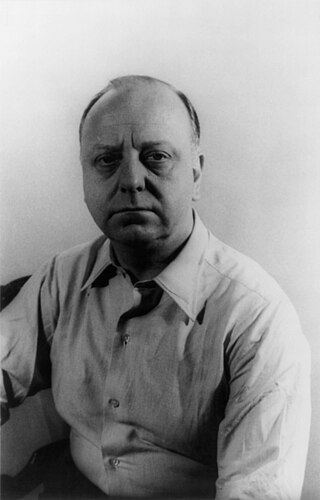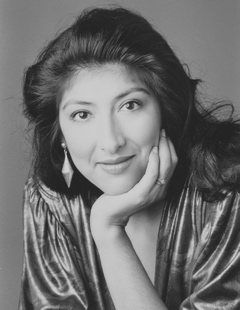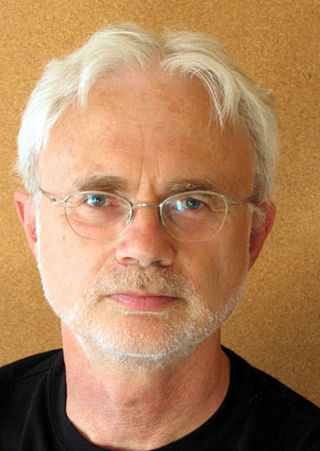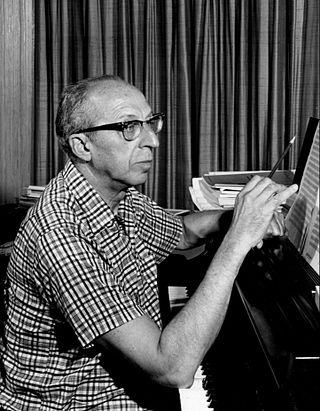Related Research Articles

Virgil Thomson was an American composer and critic. He was instrumental in the development of the "American Sound" in classical music. He has been described as a modernist, a neoromantic, a neoclassicist, and a composer of "an Olympian blend of humanity and detachment" whose "expressive voice was always carefully muted" until his late opera Lord Byron which, in contrast to all his previous work, exhibited an emotional content that rises to "moments of real passion".

Carlisle Sessions Floyd was an American composer primarily known for his operas. These stage works, for which he wrote the librettos, typically engage with themes from the American South, particularly the Post-civil war South, the Great Depression and rural life. His best known opera, Susannah, is based on a story from the Biblical Apocrypha, transferred to contemporary rural Tennessee, and written for a Southern dialect. It was premiered at Florida State University in 1955, with Phyllis Curtin in the title role. When it was staged at the New York City Opera the following year, the reception was initially mixed; some considered it a masterpiece, while others degraded it as a 'folk opera'. Subsequent performances led to an increase in Susannah's reputation and the opera quickly became among the most performed of American operas.
Symphony No. 3 was Aaron Copland's final symphony. It was written between 1944 and 1946, and its first performance took place on October 18, 1946 with the Boston Symphony Orchestra performing under Serge Koussevitzky. If the early Dance Symphony is included in the count, it is actually Copland's fourth symphony.
Miss Julie is an opera by Ned Rorem to an English libretto by Kenward Elmslie, based on the play, Miss Julie (1888), by Swedish playwright August Strindberg. It explores the subject of the intersection of social class and illicit sexual relations in late 19th-century Sweden.
Irving Gifford Fine was an American composer. Fine's work assimilated neoclassical, romantic, and serial elements. Composer Virgil Thomson described Fine's "unusual melodic grace" while Aaron Copland noted the "elegance, style, finish and...convincing continuity" of Fine's music.

Susannah is an opera in two acts by the American composer Carlisle Floyd, who wrote the libretto and music while a member of the piano faculty at Florida State University. Floyd adapted the story from the Apocryphal tale of Susannah and the Elders, though the latter story has a more positive ending. The story focuses on 18-year-old Susannah Polk, an innocent girl who is targeted as a sinner in the small mountain town of New Hope Valley, in the Southern American state of Tennessee.
"Markheim" is a short story by Robert Louis Stevenson, originally prepared for the Pall Mall Gazette in 1884, but published in 1885 in The Broken Shaft: Tales of Mid-Ocean as part of Unwin's Christmas Annual. The story was later published in Stevenson's collection The Merry Men and Other Tales and Fables (1887).
Norman Treigle (né Adanelle Wilfred Treigle was an American operatic bass-baritone, who was acclaimed for his great abilities as a singing-actor, and specialized in roles that evoked villainy and terror.
Claramae Turner was an American operatic contralto, perhaps best known for her appearance in the film Carousel (1956), adapted from the Rodgers and Hammerstein stage musical of the same name.

The Last Supper is an opera with music by Sir Harrison Birtwistle to an English and Latin libretto by Robin Blaser. Birtwistle composed the music over the period written in 1998-1999. The world premiere was given by the Berlin State Opera on 18 April 2000, with the production directed by Martin Duncan and conducted by Daniel Barenboim. It was subsequently performed by the Glyndebourne Touring Opera in October/November 2000 and the following summer at the 2001 Glyndebourne Festival. Many of the original cast returned for two concert performances at the Piccolo Teatro Studio Expo, Milan and the Teatro Valdocco, Turin on 4–5 September 2008 with the London Sinfonietta, conducted by Elgar Howarth as part of the Settembre Musica festival.
Old American Songs are two sets of songs arranged by Aaron Copland in 1950 and 1952 respectively, after research in the Sheet Music Collection of the Harris Collection of American Poetry and Plays, in the John Hay Library at Brown University. Originally scored for voice and piano, they were reworked for baritone and orchestra.

Milagro Vargas is an American mezzo-soprano known for her distinctive voice and stage presence. She has appeared as an international soloist in operatic, orchestral, chamber music and recital settings.

Joy Clements was an American lyric coloratura soprano who had a substantial opera and concert career from 1956 through the late 1970s. She notably sang regularly with both the New York City Opera and the Metropolitan Opera during the 1960s through the early 1970s. She also traveled regularly for performances with opera companies and orchestras throughout the United States but only appeared in a relatively few number of performances internationally.

Loren Driscoll was an American tenor who had an active international career from the 1950s through the mid-1980s. Driscoll was particularly noted for his performances in contemporary operas and sang in many world premieres.
The Second Hurricane is an opera in two acts by Aaron Copland to a libretto by Edwin Denby. Specifically written for school performances, it lasts just under an hour and premiered on April 21, 1937, at the Henry Street Settlement playhouse in New York City. Set in the United States in the 1930s, the opera tells the story of a group of high school students who become trapped on an island while working to rescue the victims of a hurricane.
Gregory Rose is a conductor, composer, arranger, and music director. He has conducted orchestral, choral and ensemble premieres throughout Europe and the Far East.

The Gospel According to the Other Mary is an opera-oratorio by the American composer John Adams. The world premiere took place on May 31, 2012, at the Walt Disney Concert Hall in Los Angeles with Gustavo Dudamel conducting the Los Angeles Philharmonic who also premiered the staged version on March 7, 2013, at the same venue.

Danzón cubano is a composition for two pianos by American composer Aaron Copland. The piece, written in 1942, was inspired by the Cuban genre of the same name. It was first arranged for orchestra in 1946.
Twelve Poems of Emily Dickinson is a song cycle for medium voice and piano by the American composer Aaron Copland.
Caligula is 2006 German-language opera by Detlev Glanert in four acts to a libretto by Hans-Ulrich Treichel, freely adapted from the 1945 play by Albert Camus. The published version by Boosey & Hawkes also includes an English version by Amanda Holden. The opera premiered at the Oper Frankfurt, conducted by Markus Stenz, directed by Christian Pade. The plot of Camus' play tells of the last days of Caligula.
References
- ↑ Everett, Horace and Copland, Aaron, "The Tender Land: An Opera in Two Acts: Synopsis" (Spring 1954). Tempo (New Ser.), 31: pp. 10, 12-16.
- ↑ Kerman, Joseph, "Music Reviews: The Tender Land. Opera in Three Acts" (December 1956). Notes (2nd Ser.), 14 (1): pp. 56-57.
- 1 2 Patton, Christopher W., "Discovering The Tender Land: A New Look at Aaron Copland's Opera" (Autumn 2002). American Music, 20 (3): pp. 317-340.
- 1 2 Conrad, Jon Alan (1991). "The Tender Land. Aaron Copland". The Opera Quarterly. 8 (2): 158–160. doi:10.1093/oq/8.2.158 . Retrieved 2007-09-14.
- ↑ Lindsay, Tedric Blair. Notes accompanying Albany Records recording of the opera.
- ↑ Oliver, Michael. Review of Koch International recording in Gramophone, May 2000
- ↑ Aaron Copland: the life and work of an uncommon man By Howard Pollack at google books
- ↑ Boosey & Hawkes website
- ↑ Boosey & Hawkes website
- ↑ Roseberry, Eric, "Record Reviews - Copland: The Tender Land (December 1990). Tempo (New Ser.), 175: pp. 41-42.
- ↑ Levine, Robert. Review on Classics Today website]
- ↑ Albany Records website
- ↑ https://www.theguardian.com/culture/2000/apr/01/artsfeatures1